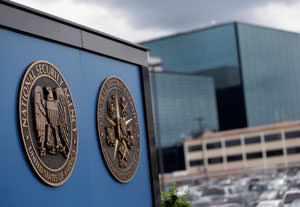The NSA Has Pissed Off the Entire World—Will the Supreme Court Intervene?
The National Security Agency has pissed off the world, and the world is fighting back.
The National Security Agency has pissed off the world, and the world is fighting back.
From the demonstrators who gathered on Capitol Hill on Oct. 26 to German Chancellor Angela Merkel who has dispatched a high-level protest delegation to the White House to the bipartisan group of senators and representatives who have introduced the USA Freedom Act to revamp the NSA, a global movement is gathering to stop the spy agency’s abuses.
For better or worse, the Supreme Court is also being asked — yet again — to join the fight. Last term, the court dismissed a lawsuit filed against the NSA by Amnesty International and other organizations over the alleged interception of emails, reasoning that none of the plaintiffs could prove their emails in fact had been seized and, therefore, that none had suffered the actual legal harm needed to satisfy the court’s strained definition of the “standing” required to prosecute a federal case (Clapper v. Amnesty Int’l).
In the coming weeks, in a vitally important and highly innovative case that has received surprisingly little media attention, the court will rule on the Justice Department’s motion to dismiss a new petition filed by the Washington, D.C.-based Electronic Privacy Information Center, which seeks to halt the NSA’s practice of collecting telephone activity records — the so-called metadata showing the numbers dialed, together with the dates and duration of calls — for virtually every American who uses a phone. Given the incredibly broad sweep of the metadata program, a substantive court ruling could have a lasting impact not only on the NSA’s future as a covert agency but on the future of privacy protections worldwide.
The EPIC petition is one of three major federal legal challenges to the metadata program brought in the wake of Edward Snowden’s disclosure of a secret order issued by Judge Roger Vinson of the Foreign Intelligence Surveillance Court, directing Verizon Business Services to turn over to the NSA all of the local, national and international phone activity records of the company’s entire list of U.S. customers. The other lawsuits, filed in San Francisco by the Electronic Frontier Foundation and in New York by the ACLU, are in the early stages of litigation and are expected to slowly make their way up the usual appellate ladder.
Seeking to jump the ladder, EPIC filed its petition directly in the Supreme Court, invoking the tribunal’s rarely exercised “original jurisdiction.” Although the vast majority of cases that come before the high court do so only after a lower judicial body has developed a factual record and entered a legal ruling, the court has the authority to hear initial filings on a limited set of disputes, such as those between states and controversies between the federal government and states.
Although such instances are unusual, two of the most famous Supreme Court cases in history have involved the institution’s original jurisdiction. In Marbury v. Madison, the 1803 opinion that established the court’s power of judicial review to declare acts of Congress and the executive unconstitutional, the court held that while it wielded such powers generally, it lacked original jurisdiction in the matter at hand to adjudicate President Thomas Jefferson’s refusal to deliver a justice of the peace commission to one of his political opponents, William Marbury.
More than a century and a half later, in 1966, the court went the other way, affirmatively exercising its original jurisdiction powers in South Carolina v. Katzenbach, when it upheld the “pre-clearance” provisions of the Voting Rights Act, which required states and local jurisdictions with histories of discrimination to obtain advance approval of proposed changes in election procedures from the Justice Department or the federal courts. Last term, under the leadership of Chief Justice John Roberts, the court gutted those same provisions.
Mindful of the Roberts court’s sharp turn to the right on most constitutional questions and wary of the precedential authority of a pre-digital era 1979 case — Smith v. Maryland, in which the court held that the Fourth Amendment’s privacy protections do not extend to telephone call records — EPIC chose not to challenge the constitutionality of the metadata program. Instead, EPIC argues that the Verizon order in particular and the metadata program generally are illegal because they violate the express provisions of the Foreign Surveillance Intelligence Act — the law Congress passed to define the scope of the NSA’s powers.
As hard as it is to remember in the post-Snowden environment of daily NSA leaks, the EPIC petition and the supporting “amicus” briefs filed by a collection of law professors and privacy advocates remind us that the FISA was enacted in 1978, after a Senate select committee chaired by the late Idaho Democrat Frank Church confirmed widespread abuses of wiretap powers committed by the FBI as part of the government’s COINTELPRO campaign to disrupt largely left-wing domestic political groups.
The act was designed, EPIC explains, not to expand NSA surveillance, but to restrict it to specific investigations of foreign agents and powers. The legislation also set up the FISA court to oversee and authorize properly targeted and legally relevant investigations.Although EPIC acknowledges that the NSA’s surveillance powers were expanded in 2001 with the passage of the Patriot Act and by subsequent amendments ratified in 2008 and 2012, it maintains that nothing in the initial or current legislation allows the NSA to access records of every phone call every American makes or receives.
Immediate review of the Verizon order under the Supreme Court’s original jurisdiction is needed, EPIC continues, because other than the Justice Department and Internet and telecom companies served with FISA court orders, no other parties are permitted to appear before a FISA court judge to challenge an NSA surveillance application. And other than the Supreme Court, no federal or state judicial body has jurisdiction to review and rescind orders like the one handed to Verizon.
In a lengthy opposition brief that would make Orwell and Kafka blush, Solicitor General Donald B. Verrilli Jr., speaking on behalf of the Obama administration, argues that the legality of the metadata surveillance program can no longer be questioned because 14 FISA court judges sitting in secret on 34 separate occasions have considered the program and issued orders like the one served on Verizon. In Verrilli’s view, that many judges simply can’t be wrong.
On the question of jurisdiction, Verrilli agrees with EPIC that only the feds or affected companies may seek appellate review of metadata orders. But he arrives at the opposite conclusion — that such limitations require the Supreme Court to dismiss EPIC’s petition rather than take up the case on its merits.
And so the legal table has been set. Will the nation’s highest court agree to examine the work of a spy agency run amok, or will it once again, as it did in the Clapper case, decide to stay out of the fight and grant Verrilli’s motion to dismiss? Despite the urgency of the issue and notwithstanding EPIC’s great and courageous work, the smart money still favors the latter.
Your support matters…Independent journalism is under threat and overshadowed by heavily funded mainstream media.
You can help level the playing field. Become a member.
Your tax-deductible contribution keeps us digging beneath the headlines to give you thought-provoking, investigative reporting and analysis that unearths what's really happening- without compromise.
Give today to support our courageous, independent journalists.






You need to be a supporter to comment.
There are currently no responses to this article.
Be the first to respond.